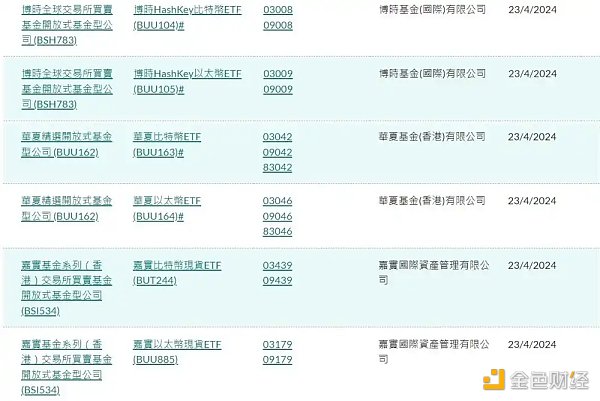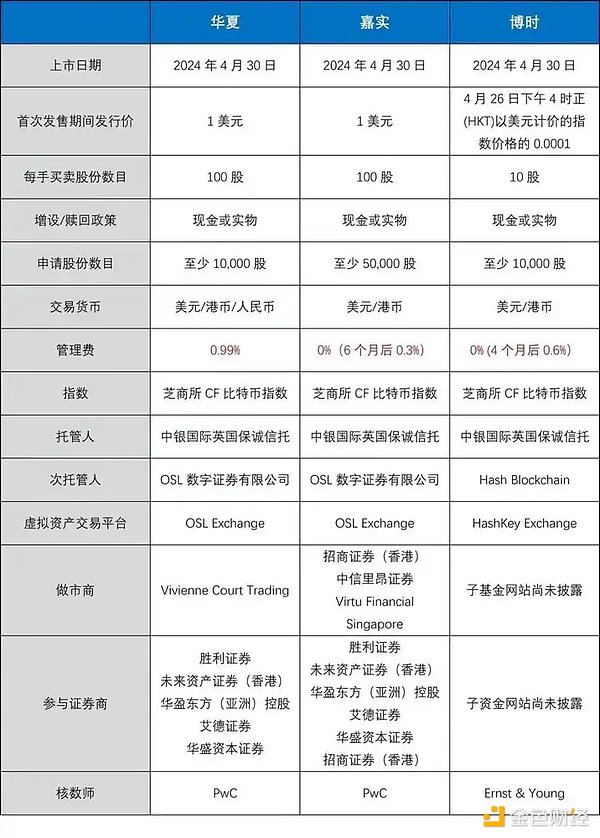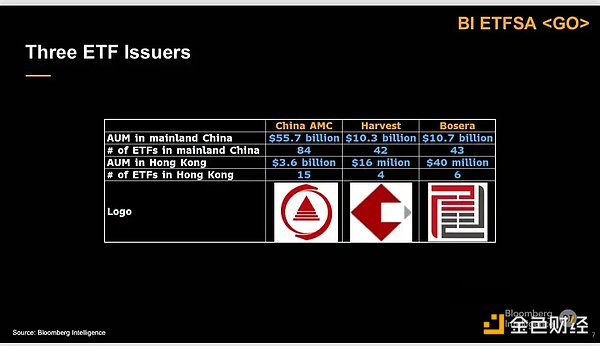Bitcoin and Ethereum spot ETFs approved for listing in Hong Kong
On Wednesday, April 23, the Hong Kong market ushered in a major milestone in the field of virtual assets. Three asset management companies: China Asset Management, Harvest Fund, and Bosera Asset Management were successfully approved to issue Bitcoin and Ethereum spot ETF products in Hong Kong. What is Bitcoin/Ethereum spot ETF: ⎡It is an exchange-traded fund (a highly liquid fund that trades during the trading day like stocks) that mainly anchors and tracks the price of Bitcoin by holding a large amount of cryptocurrency spot. Similar to gold spot ETF ⎦.

This type of product debuted in the Asian market and aims to provide investors with investment returns that are closely related to the spot prices of Bitcoin and Ethereum. Virtual asset spot ETFs simplify the investment process and reduce the difficulty of entry. Professional fund management brings standardized investment operations and risk control systems. Investors can trade these ETF products on major securities trading platforms, which not only reduces the complexity of operations but also reduces risks. In addition, this type of ETF product supports physical subscription and redemption, allowing investors to indirectly own Bitcoin by holding ETF shares without worrying about the preservation of private keys and asset security issues.
Currently, these ETF products support cash or Bitcoin subscription, but the operation must open a corresponding account in Hong Kong. According to Caixin, in accordance with the joint notice issued by the Hong Kong Securities and Futures Commission and the Hong Kong Monetary Authority in December 2023, both existing virtual asset futures ETFs and future spot ETFs shall not be provided to retail investors in areas such as mainland China where the sale of virtual asset products is restricted. However, even if they are not permanent residents of Hong Kong, mainland residents holding Hong Kong identity cards have the opportunity to participate in the trading of these ETF products on the premise of complying with relevant laws and regulations.
Details of virtual asset ETFs issued by three asset management companies
What are the differences in the details of the cryptocurrency ETFs issued by the three institutions? As an investor, which one should you choose to buy and trade? We have cited the information provided by a Hong Kong financial institution and sorted it out in detail here for investors to choose according to their own circumstances.

Listing date and issue price:
All three companies' ETF products were listed on the same day, April 30, 2024. In terms of the initial offering price, China Asset Management and Harvest Fund opened at $1, while Bosera Fund priced at 0.0001 of the CME CF Bitcoin Index price at 4:00 p.m. Hong Kong time on April 26.
Share trading and subscription requirements:
In terms of the number of shares per transaction, China Asset Management and Harvest Fund set a threshold of 100 shares, while Bosera Fund set a threshold of 10 shares. For the number of shares to be subscribed, the minimum requirement for China Asset Management and Bosera Fund is 10,000 shares, while Harvest Fund is higher, requiring at least 50,000 shares.
Addition or redemption policy:
All three companies support investors to add or redeem ETF shares through cash or in kind, which provides investors with flexibility.
Trading Currency and Management Fees:
China Asset Management supports USD, HKD and RMB trading, while Harvest Fund and Bosera Fund support USD and HKD. In terms of management fees, China Asset Management charges 0.99%, Harvest Fund does not charge management fees in the first six months, and then 0.3%, while Bosera does not charge management fees in the first four months, and then 0.6%.
Selected Index and Custodian:
The ETF products of the three companies have chosen the CME CF Bitcoin Index as the tracking target to ensure that the performance of the products can closely follow the actual dynamics of the Bitcoin market. In terms of custodians, BOCI Prudential Trustee was selected as the custodian of these ETFs, responsible for safekeeping assets and supervising fund operations. In terms of the choice of sub-custodian, China Asset Management and Harvest Fund chose OSL Digital Securities Co., Ltd., while Bosera Fund chose Hash Blockchain, a choice that reflects the different preferences of each company for asset custody and risk management.
The "CME CF Bitcoin Index" is a specific index that reflects the weighted average price of Bitcoin on different exchanges. The Bitcoin and Ethereum spot ETFs mentioned here choose to track the CME CF Bitcoin Index, which means that the purpose of these ETFs is to replicate the performance of the index as accurately as possible and provide investors with investment returns similar to buying actual Bitcoin, but in a more convenient and regulated way.
The above-mentioned "sub-custodian" is usually another financial institution entrusted by the custodian to provide custody services in a specific region or for a specific type of asset. Sometimes, due to legal, market practices or operational efficiency, a professional sub-custodian is needed to handle certain specific custody functions. The main purpose of primary and secondary is to manage efficiency and risk diversification, ensure the security of fund assets and adapt to the needs of different markets.
Trading platforms, market makers and participating securities dealers:
In terms of virtual asset trading platforms, China Asset Management and Harvest Fund both chose OSL Exchange, while Bosera Fund chose HashKey Exchange. In terms of market makers, China Asset Management chose Vivienne Court Trading, while Harvest Fund chose China Merchants Securities (Hong Kong), CITIC CLSA Securities and Virtu Financial Singapore. The market maker of Bosera Fund has not yet been disclosed. As a key role in the circulation of ETF products, participating securities dealers have chosen institutions including Victory Securities, Mirae Asset Securities (Hong Kong), Huaying Oriental (Asia) Holdings, Aide Securities and Huasheng Capital Securities, and Harvest Fund has also chosen China Merchants Securities (Hong Kong).
"Authorized Participants (APs)" are usually large financial institutions that work with ETF issuers to be responsible for the subscription and redemption process of ETFs. Participating brokers can offer a basket of stocks or other assets to an ETF in exchange for newly issued ETF shares, or redeem ETF shares for assets held by the fund. This process helps ensure that the market price of the ETF is close to its net asset value (NAV) and helps provide liquidity and market efficiency.
The role of the auditor:
Finally, to ensure the financial transparency and compliance of the ETF, China Asset Management and Harvest Fund Management chose PwC as auditor, while Bosera Fund Management chose Ernst & Young. Through the independent audit process, auditors ensure the accuracy and authenticity of the ETF's financial reports.
"Auditors" are independent third parties responsible for auditing the ETF's financial statements to ensure that they are fair, accurate, and in compliance with accounting standards. Auditors can detect and prevent errors and fraud in financial reporting through audits, providing investors with confidence in the financial status of ETFs. In some jurisdictions, the auditor's audit report is a legal requirement for disclosing ETF financial information to regulators and the public.

Bloomberg statistics on the asset management scale of the three companies
The asset management scale and the number of ETFs issued:
According to Bloomberg Intelligence, China Asset Management has $55.7 billion in assets under management in mainland China and has issued 84 ETFs in the region, while in Hong Kong, China Asset Management manages $3.6 billion in assets and has issued 15 ETFs. Harvest Fund has $10.3 billion in assets under management in mainland China and has issued 42 ETFs, while in Hong Kong, China, it has $16 million in assets under management and has issued four ETFs. Bosera Fund has slightly higher assets under management in mainland China than Harvest Fund, at $10.7 billion, and has issued 43 ETFs, while in Hong Kong, China, it has $40 million in assets under management and has issued six ETFs.
With the increasing popularity of virtual assets, these ETF products in Hong Kong provide new opportunities for global investors and also demonstrate Hong Kong's competitiveness in innovative financial products as an international financial center. For investors interested in investing in Bitcoin and Ethereum, these ETF products undoubtedly provide an option worthy of attention.
 Anais
Anais







